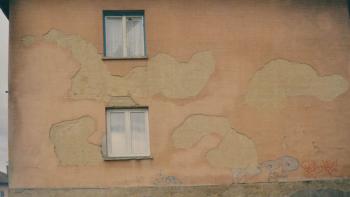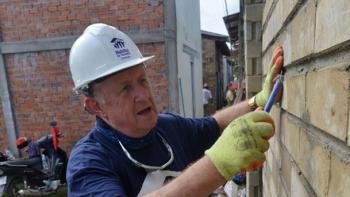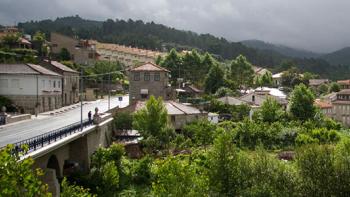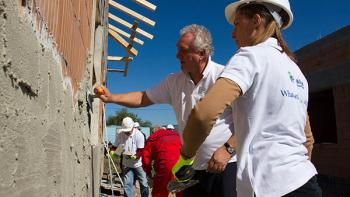Country Facts:
- Capital city – Budapest
- Population – 9.7 million
- Life expectancy – 77 years
- Unemployment rate – 4%
- Below poverty line – 12.7%
Find more country facts on: CIA The World Factbook – Hungary
Habitat Facts
- Habitat started in Hungary in 1996.
- Households served in FY2022 – 74
- Through rehabs – 3
- Through repairs – 33
- Through Ukraine program - 38
- Individuals served in FY2022
- Through social support - 681
- Volunteers hosted in FY2022 – 392
The housing need in Hungary
About one-third of Hungary’s population currently experiences poor living conditions or social marginalization. Due to growing income disparity and rising costs including extreme inflation and energy prices, housing expenses are an increasing burden. Many households are at risk of losing their homes because they cannot cover housing costs.
Habitat for Humanity has been working alongside families in Hungary since 1996. Providing affordable, quality building materials, volunteer labor, and training sessions, we help families and communities improve their housing conditions. Advocacy is an important part of our work to achieve fair and inclusive housing policies. We aim to see everyone living in decent housing that enables a healthy and active life.
How Habitat addresses the need
Secure, affordable housing
Some 200,000 to 300,000 families are in need of low-cost rental housing. About 50,000 of these families are in a severe housing crisis and risk experiencing homelessness. Many live with relatives or friends, in temporary homes, or in housing with insecure tenure. To meet the various housing needs, our programs include:
•Second Chance: we enable families living in temporary shelters to move into affordable rentals with social work care and services.
•Támasz: we provide rapid solutions for people whose housing conditions have unexpectedly deteriorated or lack basic quality or safety. We offer smaller scale support such as building materials or minor repairs.
•Falusi Lakhatás: we work with Erste Bank to support families who do not have enough savings to upgrade their apartments by helping them to access a state subsidy. The government scheme enables rural dwellers in Hungary to make major home renovations.
•VEKOP: we partner with the Municipality of Újpest to improve urban dwellers’ living conditions and promote social integration through social work and events held at a local community center.
Response to Russia-Ukraine war
When the war first broke out in February 2022, we immediately provided help — mainly material donations — along the border. To date, we have supported a total of 969 refugees from Ukraine with medium- and long-term housing. We launched our solidarity housing agency program in collaboration with the Utcáról Lakásba! (“From the Street to Homes!”) association. Through this program 38 households were provided with affordable, long-term, safe homes. We would like to continue our work by developing further programs.
Advocacy work
Through our research, policy proposals and campaigns, we urge the Hungarian government, local municipalities and other stakeholders to take concrete steps to tackle housing poverty. Our annual report on Hungary’s housing poverty status and trends seeks to analyze the effects of each year’s housing policies and budget. Through highlighting important housing topics, we trigger public discourse and support the development of fair and inclusive housing policies.
What you can do
DONATE
To donate directly to Habitat for Humanity Hungary, please contact us to learn more. https://www.habitat.hu/legy-aktiv/adomanyozas/online/
VOLUNTEER
The Global Village program is resuming region by region until a safe and quality experience can be provided at scale worldwide. Please visit habitat.org/gv for more information. In Hungary, Habitat works with local corporate or individual volunteers through renovating social rental flats.
TITHE
Habitat affiliates in the U.S. support the international work through an annual tithe. For additional information, email [email protected] or contact your local Habitat organization.
CONTACT
To learn more, please reach out to Kata Márton, Habitat Hungary volunteer program coordinator and community manager, at: katalin.marton@habitat.hu
Website: habitat.org/hu





